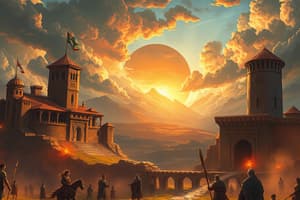Podcast
Questions and Answers
विश्व युद्ध प्रथम किस वर्ष शुरू हुआ था?
विश्व युद्ध प्रथम किस वर्ष शुरू हुआ था?
- 1905
- 1910
- 1920
- 1914 (correct)
सुमेरियन्स ने किस क्षेत्र में पहली रिकॉर्डेड लेखन सिस्टम विकसित की थी?
सुमेरियन्स ने किस क्षेत्र में पहली रिकॉर्डेड लेखन सिस्टम विकसित की थी?
- इजिप्ट
- मिसोपोटामिया (correct)
- सीनेआई
- भारत
कौन-कौन से कारणों से प्राचीन कला, साहित्य, विज्ञान, धर्म, और प्रौद्योगिकी में पहली कुछ समाजों ने महत्वपूर्ण योगदान दिया?
कौन-कौन से कारणों से प्राचीन कला, साहित्य, विज्ञान, धर्म, और प्रौद्योगिकी में पहली कुछ समाजों ने महत्वपूर्ण योगदान दिया?
- केवल कला में
- कला, साहित्य, और धर्म में
- केवल धर्म में
- कला, साहित्य, विज्ञान, धर्म, और प्रौद्योगिकी में (correct)
कुल मिलाकर कितने सैनिकों की मौत हुई थी प्रथम विश्व युद्ध में?
कुल मिलाकर कितने सैनिकों की मौत हुई थी प्रथम विश्व युद्ध में?
'सरकारों के बीच समंदरी' का संस्थापन किसके बाद हुआ?
'सरकारों के बीच समंदरी' का संस्थापन किसके बाद हुआ?
किस घटना के बाद दुनिया में जीवन के ढंग में महत्वपूर्ण परिवर्तन आए?
किस घटना के बाद दुनिया में जीवन के ढंग में महत्वपूर्ण परिवर्तन आए?
कौन सा कला-कला सम्राट 'मोना लिसा', 'लास्ट सप्पर' और 'वित्रुवियन मैन' के लिए प्रसिद्ध है?
कौन सा कला-कला सम्राट 'मोना लिसा', 'लास्ट सप्पर' और 'वित्रुवियन मैन' के लिए प्रसिद्ध है?
किस समयावधि में 'इटैलियन रिनेसाँस' महत्वपूर्ण हुआ?
किस समयावधि में 'इटैलियन रिनेसाँस' महत्वपूर्ण हुआ?
'सोवियत मिशिल संकट' का प्रसिद्ध होना हुआ था?
'सोवियत मिशिल संकट' का प्रसिद्ध होना हुआ था?
'मार्टिन लूथर किंग जूनि.' कौन सी प्रमुखहे हैं?
'मार्टिन लूथर किंग जूनि.' कौन सी प्रमुखहे हैं?
Flashcards are hidden until you start studying
Study Notes
Ancient Civilizations
The history of human civilization is vast and complex, stretching back millennia. Among some of the earliest known societies were those of Egypt, Greece, Rome, China, India, and Mesopotamia. These civilizations laid the foundation for what would become modern society through their advancements in art, architecture, literature, science, religion, and technology. For example, early Greek philosophers like Socrates, Plato, Aristotle, Thales, Pythagoreans, Democritus made significant contributions to our understanding of the world around us. Similarly, the first recorded writing system was developed by the Sumerians in Babylonia circa 3500 BCE. In many ways, these ancient cultures set the stage for the more recent times we will cover - from wars to artistic movements to global events shaping who we are today.
World War I
One pivotal event in human history was World War I, which lasted from 1914 until 1918. This war resulted from nationalism, military alliances, imperialism, militarism, and ethnic rivalries—all causes central to various European countries' conflicts with each other over territory and power. It devastated entire populations; estimates suggest upwards of six million soldiers died in combat along with another seven million civilians. The League of Nations was established after WWI to ensure peace among nations. However, this did little to prevent future hostilities since it didn’t have enough authority to enforce binding decisions on its members. Despite its tragic consequences, WWI also led to fundamental changes in how people lived their lives because it marked the beginning of two new eras – the Roaring Twenties and the Great Depression.
Renaissance
Another important period in history is the Italian Renaissance between approximately 1400 CE and 1600 CE. During this time, there was great interest in exploring the natural world and perfecting skills such as painting, poetry, sculpture, etc., leading to numerous inventions including printing presses and telescopes. One notable artist during this era was Leonardo da Vinci, famous for his paintings 'Mona Lisa,' 'Last Supper,' and 'Vitruvian Man'. The renaissance helped Europe transition into modernity while preserving cherished cultural heritage.
Cold War
After World War II ended in 1945, tensions rose between East and West due largely to ideological differences pertaining to democracy versus communism. This conflict became known as the cold war lasting roughly forty years from 1947 to 1989. Several factors contributed to tension among superpowers, including nuclear weapons buildup, geopolitical disagreements, economic issues, and political systems. Many consider the Cuban Missile Crisis of October 1962 as one of the most dangerous moments when Soviet missiles aimed at targets within range of American cities. Eventually, however, diplomacy prevailed, resulting in greater cooperation among former adversaries.
Civil Rights Movement
In more contemporary times, the civil rights movement gained tremendous momentum starting in the mid-twentieth century. Sparked by Martin Luther King Jr.'s nonviolent protests against segregation laws during the Montgomery bus boycott in Alabama in 1955, this movement sought equal protection under law regardless of race or gender. Over several decades, activists successfully changed discriminatory policies making life better for millions of Americans. Other prominent leaders involved included Malcolm X, Rosa Parks, James Brown, Muhammad Ali, Fannie Lou Hamer, Huey Newton, Angela Davis, John Carlos, Tommie Smith, Stokely Carmichael, Eldridge Cleaver, Richard Nixon, Lyndon Baines Johnson, Ralph Abernathy, Whitney Young Jr., Roy Wilkins, Andrew Goodman, Michael Schwerner, James Chaney, Fred Shuttlesworth, Deacons for Defense and Justice, Medgar Evers, Meditations on Violence (Carter G Woodson), Meditation on Nonviolence (Martin Luther King Jr.), Amos Wilson, and Gloria Steinem. As this brief overview shows, the struggle continues today towards full equality worldwide based upon respect for individual dignity, regardless of socioeconomic status or identity characteristics.
Studying That Suits You
Use AI to generate personalized quizzes and flashcards to suit your learning preferences.




